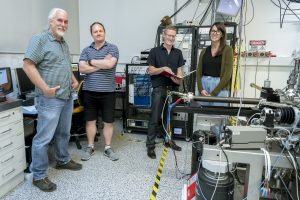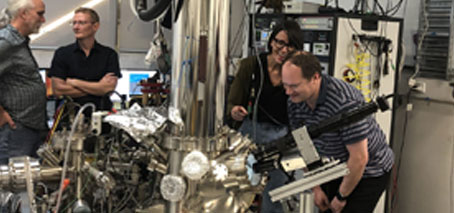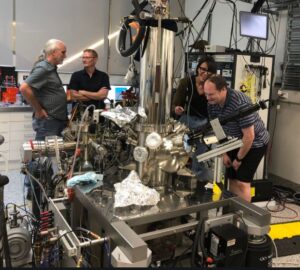Welcome to FLEET’s long-time collaborator Dr Simon Granville, who this month joins the Centre as a Partner Investigator.
Simon is a Principal Investigator at FLEET’s partner organisation the MacDiarmid Institute for Advanced Materials and Nanotechnology, where he leads the Institute’s Future Computing project to control electron transport and spin through superconductivity and topology.
As a Senior Scientist at the Robinson Research Institute (Victoria University of Wellington), Simon applies his expertise in magnetic thin films and structures to the preparation of highly energy-efficient, fast spintronic devices for computing and sensing.

Simon Granville with FLEET collaborators. From left: FLEET Director Prof Michael Fuhrer, Simon, FLEET AI Dr Mark Edmonds, FLEET CI Dr Julie Karel
Simon’s research is highly complementary to FLEET research objectives, and over the past several years he has been active in research projects with FLEET Investigators:
- Dr Julie Karel (Monash): demonstrating energy-efficient switching in a magnetic multilayer device using the anomalous spin Hall effect (project in progress)
- Dr David Cortie (UoW): determining effect of magnetic proximity effect on the magneto-transport properties in ferromagnetic Heusler/heavy metal structures (paper in progress)
- A/Prof Nikhil Medhekar (Monash): the properties of a room-temperature ferromagnetic Weyl semi-metal, Co2MnGa (npj Quantum Materials, 2021)
- Prof Jan Seidel (UNSW): topotactic control of magnetic properties and skyrmions in SrCoFeO3 and CoZnMn (Advanced Electronic Materials, 2020)
- Prof Jan Seidel (UNSW) Simon is a Partner Investigator on a funded ARC Discovery Programme on magnetic skyrmions.
- Prof Jared Cole (RMIT) Simon is the NZ Principal Investigator on Jared’s Royal Society of NZ Catalyst Fund International Leader Fellowship, which will involve Jared travelling to NZ for ~10-15 weeks over the next 3 years to collaborate with Simon (among others) on modelling spintronic and superconducting ‘beyond-CMOS’ devices.
The MacDiarmid Institute is the premier centre for materials research in NZ, with co-Directors Prof Justin Hodgkiss and A/Prof Nicola Gaston also FLEET Partner Investigators. Both organisations focus on fundamental materials science research to create a paradigm change in computational capability.
As well as developing new materials and devices for future low-energy electronics, MacDiarmid and FLEET share broader commitments including science-outreach, education and improvements to the equity and diversity landscape within science.
In addition to scientific collaborations above, Simon is already working with FLEET on collaborative outreach projects, including developing a MacDiarmid version of the popular FLEET superconducting track at MacDiarmid’s DiscoveryCamp, which encourages young Māori and Pacific Island students to realise their potential in science.
Read more: MacDiarmid-FLEET partnership aiding search for sustainable future computing



